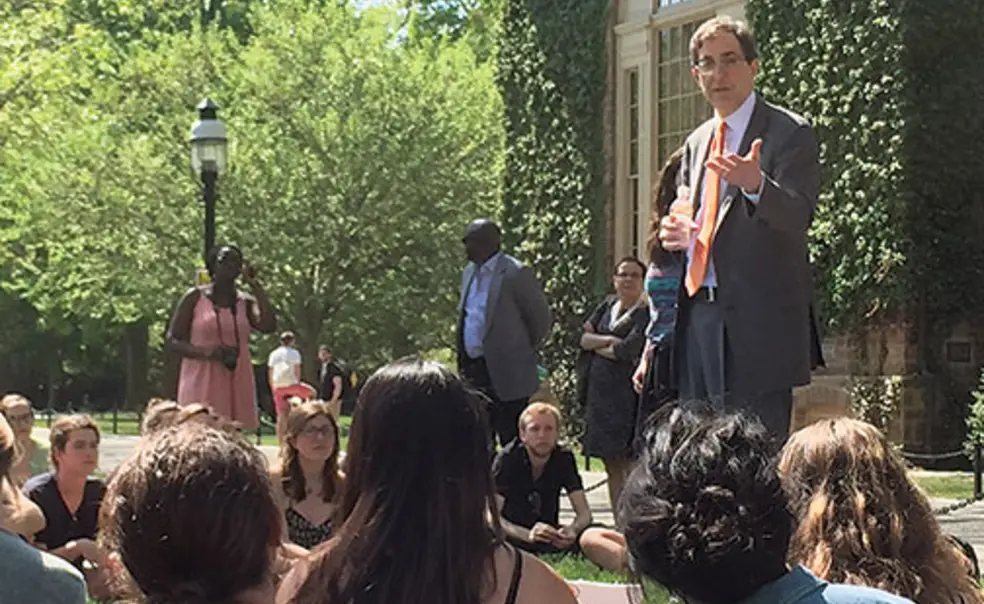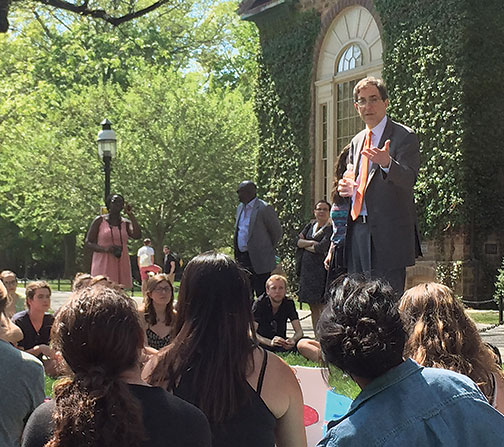Abolish the Box?
Students press their campaign to end admission query on criminal history
Students took their campaign to President Eisgruber ’83 to end the University’s use of a question asking admission applicants’ criminal history and disciplinary actions.
The Common Application asks applicants about disciplinary penalties during high school or if they have been found guilty of a crime. Students have called on colleges to “abolish the box,” saying that asking the question is “discriminatory and oppressive” because the justice system does not treat all people equally.
Members of the group Students for Prison Education and Reform (SPEAR) presented Eisgruber with a petition containing more than 1,000 signatures May 7. The president spoke at a teach-in later that day sponsored by the group outside East Pyne Hall.
Eisgruber said the University had changed its hiring policies for staff positions last year. Previously, a question about the applicant’s criminal record was one of the first things asked. Now, candidates are not asked the question until the end of the hiring process. Eisgruber said he would be “interested in seeing whether such a policy could be used in the undergraduate applications process as well.” Students applying to the Graduate School are not asked about their criminal history as part of the application process.
In the current undergraduate admission process, a “checked box” on the criminal-history question is not an automatic disqualifier, said Dean of Admission Janet Rapelye. “We do a holistic review of each file, and there might be circumstances we take into consideration that would lead us to admit a student,” she said.
Joel Simwinga ’15, a member of SPEAR, said the group plans to continue to work both on campus and on a national level to abolish the box from all college applications.













1 Response
Michael P. Goldstein ’69
10 Years AgoAdmission Questions
Yes! Seeking criminal and disciplinary histories on admission applications is like a medical test that generates false positives and negatives willy-nilly (“Abolish the Box,” On the Campus, July 8). Discriminatory policing and prosecution, plus plea bargains forced by risks of unacceptable consequences of going to trial, give poor whites and people of color records they should not have. Meanwhile, miscreants who have escaped detection or received leniency are undetected by “the box.”
The dean of admission says a checked box does not automatically disqualify. President Eisgruber ’83 suggests delaying asking the question until late in the admission process. However, we are years away from being free from society’s white-supremacist biases so that staff could reliably evaluate the meaning of a “yes” even then.
An equally rational question: “In the last three years, have you intentionally caused another bodily injury, appropriated or damaged another’s physical or intellectual property, practiced deception causing genuine harm to another or society, or incited others to do such acts? If so, explain and say how you feel about it now.” Of the few who should answer “yes,” some would not do so, but data obtained in this manner would at least be as reliable as that obtained now, and without the collateral damage. I doubt that the unreliability of all available systems for evaluating applicants’ moral histories causes much harm to the school.
Unfair outcomes aside, let’s stop sending potential applicants with records the message that the institution trusts unfair judicial and school disciplinary systems and will see the applicants as morally deficient. They get enough of that elsewhere.